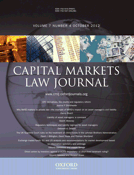
Capital Markets Law Journal
Scope & Guideline
Bridging Legal Insights with Market Dynamics.
Introduction
Aims and Scopes
- Regulatory Frameworks and Compliance:
The journal emphasizes the analysis of legal frameworks and compliance requirements within capital markets, including examinations of regulations such as the Sustainable Finance Disclosure Regulation (SFDR) and Market in Crypto-assets Regulation (MiCAR). - Sustainable Finance and ESG Considerations:
There is a significant focus on sustainability-related topics, particularly Environmental, Social, and Governance (ESG) criteria, which are increasingly influencing investment decisions and regulatory practices. - Innovations in Financial Technologies:
The journal explores the impact of technological advancements on capital markets, including discussions on cryptocurrencies, digital finance, and the implications of decentralized finance (DeFi) on traditional regulatory structures. - International Perspectives on Capital Markets:
The journal covers a global perspective on capital markets, analyzing the regulatory approaches and challenges faced by different jurisdictions, such as the US, UK, EU, and emerging markets. - Investor Protection and Corporate Governance:
A core area of focus is the protection of investors and corporate governance issues, including the roles of auditors, insider trading regulations, and mechanisms for safeguarding minority shareholder interests.
Trending and Emerging
- Sustainability and Green Finance:
Papers addressing sustainability-linked finance, including green bonds and ESG regulations, have surged, highlighting the increasing importance of sustainable investment practices. - Cryptocurrency and Digital Assets Regulation:
There is a notable rise in research related to the regulation of cryptocurrencies, digital assets, and decentralized finance, as these areas present new challenges and opportunities for legal frameworks. - ESG Litigation and Corporate Responsibility:
Emerging themes around ESG litigation and corporate conscience indicate a growing concern for accountability in corporate practices, reflecting societal demands for responsible investing. - Technological Innovations in Financial Markets:
The exploration of technological advancements, such as Central Bank Digital Currencies (CBDCs) and distributed ledger technology, has gained prominence as these innovations reshape traditional market structures. - Investor Protection Mechanisms:
An increased focus on mechanisms for investor protection, particularly in the context of new financial products and market practices, underscores the ongoing need for regulatory adaptations.
Declining or Waning
- Traditional Banking Regulations:
Discussions surrounding traditional banking regulations have decreased, possibly due to the rise of fintech and alternative financial systems overshadowing conventional banking practices. - Sovereign Debt Restructuring:
While still relevant, the frequency of papers specifically addressing sovereign debt restructuring appears to be waning as the focus shifts towards innovative financial solutions and sustainability-linked instruments. - Historical Analysis of Financial Crises:
Research exploring historical financial crises and their legal implications has become less frequent, indicating a potential shift towards forward-looking analyses rather than retrospective evaluations. - Fixed Income Instruments:
There seems to be a reduced emphasis on traditional fixed-income instruments and their regulatory challenges, as newer financial products and technologies gain attention. - Cross-Border Financial Regulations:
The depth of analysis on cross-border financial regulations has diminished, possibly as global capital markets become more interconnected and the focus shifts to specific regional regulatory challenges.
Similar Journals

JOURNAL OF FINANCIAL ECONOMICS
Uncovering cutting-edge studies in financial economics.Welcome to the JOURNAL OF FINANCIAL ECONOMICS, a premier publication in the realms of finance, economics, and accounting, published by Elsevier Science SA in the Netherlands. With its impactful contributions since 1974, this esteemed journal has earned an impressive impact factor and consistently ranks in the Q1 category across various fields, including Accounting, Economics and Econometrics, Finance, and Strategy and Management. Researchers can access cutting-edge studies that delve into both theoretical frameworks and empirical analyses, crucial for advancing financial literacy and economic policies globally. With remarkable Scopus rankings, notably placing #2 in Accounting and #6 in Finance, the journal serves not only as a reliable resource for academics but also as a vital tool for professionals seeking to stay abreast of the latest financial trends and insights. Engage with the latest research and contribute to the dialogue shaping the future of financial economics!

Borsa Istanbul Review
Elevating research standards in Economics and Finance.Borsa Istanbul Review, published by ELSEVIER, is a premier open-access journal making significant contributions to the field of Economics and Finance since its inception in 2013. With a commendable Q1 rating in both categories according to the 2023 metrics, this journal ranks impressively at #36 out of 317 in Finance and #91 out of 716 in Economics and Econometrics on Scopus, placing it in the top tier of international academic publications. The journal not only provides a platform for rigorous and innovative research but also aims to foster a deeper understanding of the evolving economic landscape, particularly within the frameworks of emerging markets. Catering to researchers, professionals, and students alike, Borsa Istanbul Review is dedicated to delivering high-quality, peer-reviewed scholarly articles that are freely accessible to enhance global research collaboration. It serves as an essential resource for anyone looking to stay abreast of cutting-edge developments in the financial and economic sectors.
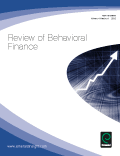
Review of Behavioral Finance
Decoding the Human Element in Financial Decision-MakingReview of Behavioral Finance is a distinguished journal published by Emerald Group Publishing Ltd, focusing on the dynamic interplay of psychology and finance. With an ISSN of 1940-5979 and an E-ISSN of 1940-5987, this journal serves as a pivotal platform for researchers, professionals, and students keen on exploring innovative behavioral financial practices. Operating from the United Kingdom, the journal has made significant strides since its inception in 2009, converging years up to 2024. It is well-regarded in its field, achieving Q2 rankings in Accounting, Finance, and Strategy and Management for 2023, reflecting its influential contributions to these domains. The journal's rigorous peer-review process guarantees the quality of published research, making it an essential resource for academics seeking to enhance their understanding of behavioral finance. While the journal does not currently offer open access, it remains accessible through various academic databases, facilitating the dissemination of vital financial insights. Engage with the cutting-edge research that shapes the future of finance today!

Journal of Financial Regulation
Illuminating critical issues in financial oversight.The Journal of Financial Regulation, published by Oxford University Press, serves as a pivotal platform for research and discourse in the field of finance and regulatory frameworks. Since its inception in 2015, this esteemed journal has captured the attention of scholars and practitioners alike, achieving a notable Q2 ranking in the finance category (as of 2023) and securing its place among the top 20% of journals in its field. With a robust focus on contemporary issues surrounding financial regulation and governance, the journal provides valuable insights and comprehensive analyses relevant to both global and local regulatory environments. Although it is not an open access journal, it offers exclusive content that is crucial for advancing knowledge in finance, evidenced by its strong performance with a Scopus rank of #65 out of 317 in the disciplines of Economics, Econometrics, and Finance. Researchers, professionals, and students are encouraged to explore the rich array of articles that contribute to the ongoing conversation in financial regulation, making it an essential resource for anyone engaged in the field.
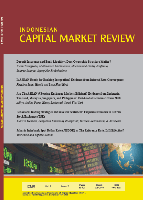
Indonesian Capital Market Review
Illuminating Investment Strategies for a Global AudienceIndonesian Capital Market Review is a prominent academic journal dedicated to the exploration of financial markets, investment strategies, and economic policies within Indonesia and Southeast Asia. Published by Universitas Indonesia, this journal has been an essential resource for researchers, professionals, and students since its inception in 2009, offering open access to its content to promote wider dissemination of knowledge. With an ISSN of 1979-8997 and an E-ISSN of 2356-3818, it aims to bridge the gap between theoretical frameworks and practical applications in the capital markets. By rigorously vetting its publications, the journal enhances the academic discourse surrounding financial systems, thereby empowering stakeholders with empirical insights. The commitment to open access ensures that groundbreaking research is readily available to a global audience, advancing the understanding of capital market dynamics in Indonesia and beyond.
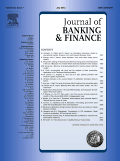
JOURNAL OF BANKING & FINANCE
Advancing the Frontiers of Financial KnowledgeWelcome to the Journal of Banking & Finance, a premier publication in the fields of finance and economics, expertly published by Elsevier. With its esteemed Q1 ranking in both the Economics and Econometrics and Finance categories for 2023, this journal frequently garners significant attention from researchers, professionals, and academics alike. Established in 1977, it has become a crucial resource for the latest research and advancements in banking and financial services, influencing policies and practices on a global scale. The journal's commitment to high-quality, peer-reviewed content ensures that it not only contributes to academic discourse but also drives real-world financial innovation. As part of the respected Elsevier publishing collection, the journal's rigorous standards and comprehensive analysis serve as indispensable tools for those seeking to understand and navigate the complexities of the financial landscape. Located in the Netherlands, the Journal of Banking & Finance continues to play a vital role in shaping the future of financial research through its impactful insights and research contributions.
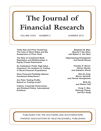
JOURNAL OF FINANCIAL RESEARCH
Bridging Theory and Practice in FinanceThe JOURNAL OF FINANCIAL RESEARCH, published by WILEY, stands as a pivotal platform for disseminating innovative research in the fields of finance and accounting since its inception in 1978. With an ISSN of 0270-2592 and an E-ISSN of 1475-6803, this journal aims to address contemporary challenges and trends within the financial research landscape. It has achieved notable recognition, being placed in the Q2 category for both Finance and Accounting in the 2023 rankings, signifying its relevance and impact within the academic community. Although it does not currently offer open access, the journal is accessible through various academic databases, catering to a diverse audience of researchers, professionals, and students keen on advancing their knowledge and understanding of financial systems and methodologies. With an evolving scope that encompasses empirical studies, theoretical frameworks, and practical applications, the JOURNAL OF FINANCIAL RESEARCH is committed to contributing valuable insights into the complexities of financial practices and policies.

EMERGING MARKETS FINANCE AND TRADE
Illuminating the Path to Financial EvolutionEmerging Markets Finance and Trade is a leading academic journal published by Routledge Journals, Taylor & Francis Ltd, specializing in the dynamic field of finance and trade within emerging markets. This journal boasts an impressive impact factor and ranks in the top quartiles of its categories, attaining Q1 status in Economics, Econometrics and Finance (miscellaneous) and Q2 in Finance as of 2023. With a strong focus on innovative research, it publishes cutting-edge studies and insights that are crucial for understanding the complexities of financial systems in emerging economies. The journal, with ISSN numbers 1540-496X and 1558-0938 for its electronic version, offers a platform for both established researchers and newcomers in the field, highlighting the latest trends, policies, and challenges in finance and trade from 2002 to 2024. While it maintains a subscription-based access model, its significant contributions make it a must-read for academics, professionals, and students alike who seek to navigate and influence the rapidly evolving landscape of emerging markets.
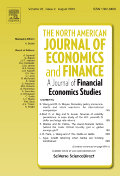
North American Journal of Economics and Finance
Fostering rigorous exploration in finance and economics.The North American Journal of Economics and Finance is a premier academic journal published by Elsevier Science Inc. since 1992, dedicated to advancing the field of economics and finance through rigorous research and scholarship. With an impressive impact factor and recognition in the Q2 category for Economics and Econometrics and Q1 for Finance as of 2023, this journal holds a significant position in the academic community, ranked #41 out of 317 in Finance and #100 out of 716 in Economics. The journal features high-quality, peer-reviewed articles that cover a broad range of topics, from theoretical frameworks to empirical analyses and practical applications. Though not an open-access platform, the journal provides valuable insights for researchers, practitioners, and students alike, promoting knowledge dissemination in the dynamic landscape of economic and financial studies. With its commitment to excellence, the North American Journal of Economics and Finance serves as an essential resource for those seeking to deepen their understanding of contemporary issues in these critical fields.
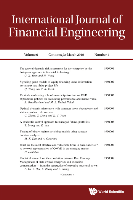
International Journal of Financial Engineering
Driving excellence in financial engineering research.The International Journal of Financial Engineering, published by WORLD SCIENTIFIC PUBL CO PTE LTD, is a premier academic journal dedicated to advancing the field of financial engineering. With a ISSN of 2424-7863 and an E-ISSN of 2424-7944, this journal offers a platform for groundbreaking research that intersects finance, mathematics, and computational techniques, promoting innovative solutions to complex financial problems. As a vital resource for researchers, practitioners, and students alike, the journal aims to disseminate cutting-edge methodologies and empirical studies that drive the financial industry forward. While the journal operates under a subscription model, its rigorous peer-review process ensures that only high-quality research is published, maintaining its significance within the academic community. With an ever-growing focus on quantitative finance and derivative pricing, the International Journal of Financial Engineering is essential for those seeking to enhance their understanding of financial markets and engineering.